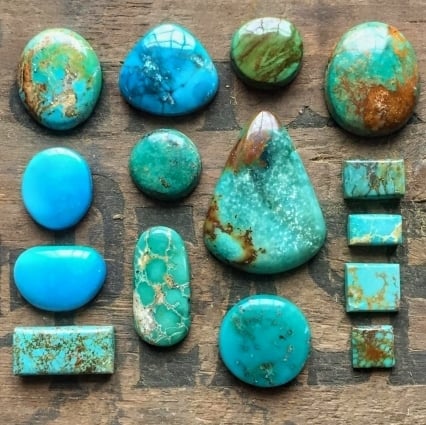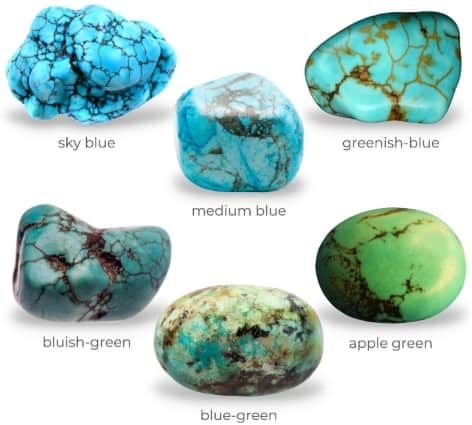High-quality turquoise is still fairly affordable in all sizes, costing between $1.00 to $10.00 per carat or $5.00 to $50.00 per gram. Some gem dealers will charge a premium depending on where the turquoise was sourced and how much supply is on the market.
Turquoise comes in a range of tones and saturations and can be found with matrix mixed in. The brighter the blue or blue-green the higher the cost per carat or gram. The main sources of high-quality aquamarine come from China, Iran, Tibet, Australia, and the United States.

How to determine Turquoise’s value and cost
When determining the value of the gemstone you will be using GIA guidelines which means color, clarity, carat weight, and cut. You’ll want to look at each one of these individually and then circle back when finished to evaluate the stone as a whole. If you need help identifying turquoise then go here first.
Color – The more intense the color the more valuable the stone is. When dealing with warm colors, think of red and orange, you’ll want to determine if there are brown undertones. If you can’t see brown undertones then the color should be very vibrant. The more vibrant and saturated the color the more expensive the gemstone. If the gemstone has a unique “neon-like glow” then it will demand the highest price per carat.
Turquoise is famous for its blue hues, but shades of blue-green, green, and even yellowish green also occur. When determining which color of turquoise commands the highest price per carat then you would go with a bright blue color with a hint of green.
Clarity – Buyers, and collectors prefer stones with no internal inclusions visible to the eye. Prasiolite can be found with visible inclusions all the way to flawless. To determine the clarity ranking you’ll need at a minimum a 10x loop and a higher-powered microscope to confirm internally flawless and flawless designations.
If you can visibly see the inclusion while holding the gemstone then the highest designation would be SI1 and if the inclusion detracts from the overall beauty of the stone then the clarity designation would be I1 – I3.
Clarity designations – FL, IF, VVS1, VVS2, VS1, VS2, SI1, SI2, I1, I2, I3

Carat – Turquoise can be found in sizes ranging from below 1 carat to above 10 carats. Generally speaking, turquoise can be sourced in any carat or gram weight. The larger the stone doesn’t necessarily mean it’s worth more money per carat due to rarity.
Cut – It is sad to say but cut has the least impact on value and cost unless it affects the stone in an extreme way. For example, when you look at the stone you would be able to see through it which means light is not being reflected back to the eye. This is called a window in the stone and it would have to be quite large to impact the price. The other extreme would occur when you look at a stone and see a rough circle or oval shape inside the stone. This occurs when the stone is very shallow and it’s reflecting the rough girdle inside the stone. Note: the girdle is the edge/side of the stone where the pavilion and crown meet.

Turquoise Colors by Value
Sky Blue Turquoise price per carat = $7.00 – $10.00
- Large sizes are common
- Mostly found in trendy jewelry
Medium Blue Turquoise price per carat = $6.00 – $9.00
- Common in all sizes
- Can be found in sterling silver jewelry
Greenish Blue Turquoise price per carat = $2.00 – $7.00
- Range in size
- Fairly common
How valuable is Turquoise?
Turquoise has never brought a higher dollar per carat because of its abundance. There are stones selling for higher prices because of where they were mined and if there’s supply available. If you’re looking to add turquoise to your collection then you should focus on stones that were mined in locations that no longer produce material.
Values of Turquoise
Each year I do research on market prices for turquoise and I can tell you the prices for blue and blue-green stones are slowly appreciating because they’re becoming harder to find if you’re looking for quantity. The lower-quality stones are commercially available and prices are fairly constant.
If you’re not sure how to value a gemstone then you should consider a gemstone appraisal. Individuals acquiring gemstones through inheritance, estate sales, and auctions typically have the gemstone appraised to determine the value and to ensure the gem is what they think it is.
- Identify Enstatite - March 12, 2024
- Identify Cerussite - March 3, 2024
- Identify Bytownite - February 18, 2024

10 Responses
Thank you for sharing this information. Perhaps you could steer me in the direction in which I would be able to inquire about raw uncut turquoise that I have. Ranging in size from softball to marble. Also have slivers, chunks and small pieces that I have harvested found traded for throughout the years. Any and all information is greatly appreciated for I am completely ignorant when it comes to things of this nature. Please continue sharing your wisdom as well as fascinating finds.
Summer – I emailed you directly
Hi
I have about 10lbs of raw turquoise my Aunt and Uncle got from panning in Nevada. I’ve had it for years to make jewelry with, where can I get get a quote of its worth. It’s been in my garage for 30 years now.
Use the contact form on the site and I’ll do my best.
I have a rock of turquoise anout half the size of a golf ball. Sky Blue. Do I weigh it with normal weight or do I use Troy.??
Please Help,
Tracey
Use grams
I have a necklace made of turquoise carved into animals of various sizes. I would like to find out the value, and find out if there is someone who might be interested in buying it from me? Weight of the necklace is 195.61155 grams (6.9 oz). I can send a picture of it if you like?
Thanks so much for your time!
Kim Schroeder
I emailed you directly
Happy to help
Very informative! Thank you. I found a really cool turquoise, carnelian, sodalite and pearl necklace at an estate sale. It’s very heavy, (6.8 oz) and long (maybe 34-36″). There’s a jeweler’s mark on the clasp but I can’t make it out. Probably of little value, but it’s so pretty! The pearls are yellow and almost a champagne color.
I think the turquoise is real. Sodalite and carnelian appear to be real as well.
Thanks so much for sharing